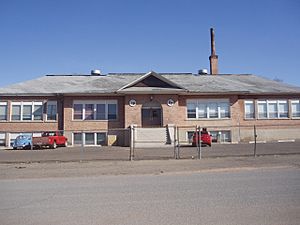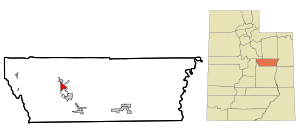Spring Glen, Utah facts for kids
Quick facts for kids
Spring Glen, Utah
|
|
|---|---|

Spring Glen's 1927 schoolhouse
|
|

Location in Carbon County and the state of Utah
|
|
| Country | |
| State | |
| County | Carbon |
| Settled | 1878 |
| Founded by | James Gay |
| Area | |
| • Total | 3.4 sq mi (8.8 km2) |
| • Land | 3.4 sq mi (8.8 km2) |
| • Water | 0 sq mi (0.0 km2) |
| Elevation | 5,771 ft (1,759 m) |
| Population
(2020)
|
|
| • Total | 1,054 |
| • Density | 330/sq mi (127.4/km2) |
| Time zone | UTC-7 (Mountain (MST)) |
| • Summer (DST) | UTC-6 (MDT) |
| ZIP code |
84526
|
| Area code(s) | 435 |
| GNIS feature ID | 2584777 |
Spring Glen is a small community in Carbon County, located in eastern Utah, United States. It is known as a census-designated place (CDP). This means it's an area identified by the U.S. Census Bureau for statistical purposes. In 2020, about 1,054 people lived there.
Spring Glen was first settled in 1878. It was the very first permanent settlement in what is now Carbon County. At first, mostly white farmers who were members of The Church of Jesus Christ of Latter-day Saints lived here. After 1890, the community became more diverse. Many immigrants from Southern Europe and other places moved in to work in the area's coal mines.
Contents
History of Spring Glen
The first people to settle in Spring Glen were a few farmers. James Gay arrived in 1878. More friends and family soon joined these first settlers. Many of these early residents were independent. They were not part of the organized effort to settle what became Emery County.
Early Community Development
As families grew, a school was started in 1883. However, public projects like schools were rare at first. The early settlers were not always keen on working together. It was hard to get them to cooperate on community projects.
The LDS Church formed a local group, called a ward, in 1883. But it took a few more years for a big project to start. In the winter of 1886–1887, a group was formed to build an irrigation canal. This canal was very important for farming. It was finally finished in 1893.
Naming the Village
The company that built the canal decided on the name Spring Glen for both the village and the company. The official survey of the Spring Glen townsite happened on May 27–28, 1890.
For a short time, from 1910 to 1925, the settlement was called Ewell. This name honored Francis M. Ewell. He was an early settler who arrived in 1882 and passed away in 1905. The nearby community of Helper was once part of Spring Glen until 1891.
Geography and Climate
Spring Glen is located along the Price River. It is just south of Helper and southwest of Kenilworth. To the southeast, you will find Carbonville and the county seat, Price.
Transportation Routes
U.S. Route 6 passes by Spring Glen. This highway connects Price and Helper. SR-139 branches off U.S. Route 6 to the east. It becomes Spring Glen Road, which is the main street through the town.
Land Area and Weather
According to the United States Census Bureau, Spring Glen covers about 3.4 square miles (8.8 square kilometers). All of this area is land.
Spring Glen has a humid continental climate. This type of climate is known for big temperature changes between seasons. Summers are warm to hot, and often humid. Winters are cold, sometimes very cold.
Population Information
| Historical population | |||
|---|---|---|---|
| Census | Pop. | %± | |
| 1890 | 137 | — | |
| 1900 | 214 | 56.2% | |
| 1910 | 181 | −15.4% | |
| 1920 | 298 | 64.6% | |
| 1930 | 659 | 121.1% | |
| 1940 | 888 | 34.7% | |
| 1950 | 929 | 4.6% | |
| 2010 | 1,126 | — | |
| 2020 | 1,054 | −6.4% | |
| Source: U.S. Census Bureau | |||
In 2010, the census counted 1,126 people living in Spring Glen. There were 478 housing units, and 421 of them were lived in.
Most of the people living in Spring Glen were White (95.6%). There were also smaller numbers of other groups. These included Black or African American (0.2%), American Indian and Alaska Native (0.4%), and Asian (1.0%). Some people were Native Hawaiian and Other Pacific Islander (0.2%). About 1.3% were from other races, and 1.3% were from two or more races. People of Hispanic or Latino background made up 7.2% of the population.
See also
 In Spanish: Spring Glen (Utah) para niños
In Spanish: Spring Glen (Utah) para niños
 | Emma Amos |
 | Edward Mitchell Bannister |
 | Larry D. Alexander |
 | Ernie Barnes |

